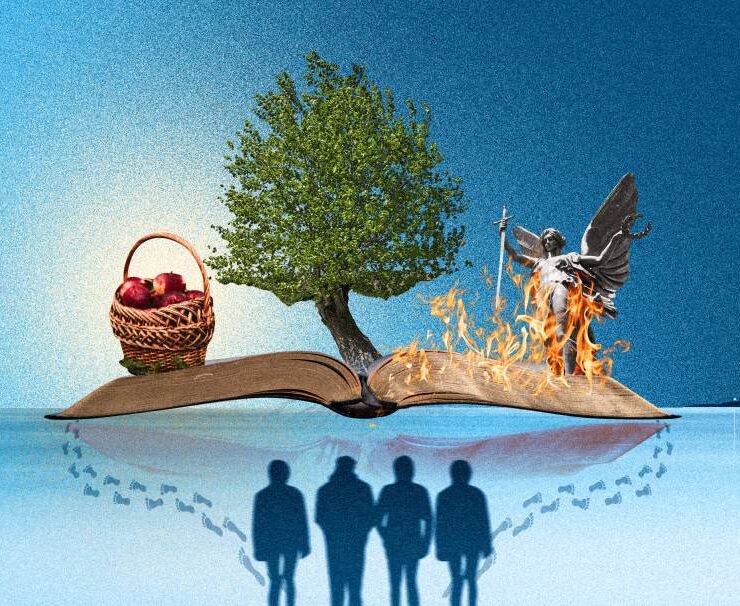Making ourselves vulnerable to God’s love and grace

April 21—Fourth Sunday of Easter, Good Shepherd Sunday
Readings: Acts 4:8-12: Psalm 118, R. The stone rejected by the builders has become the cornerstone.; 1 Jn 3:1-2; Gospel—Jn 10:11-18
This Sunday is the feast day of the Cathedral of the Diocese of Novaliches, the Cathedral Shrine Parish of the Good Shepherd. Part of the advocacy of the community is to make it a shrine for government servant-leaders.
At one of the recent events in the cathedral, one of the local government officials made a remark that his hope is that the often mentioned “separation of church and state” will become less of a hindrance of the two institutions coming together to render genuine service to the last, the lost and the least of the community.
Today, I invite all of you to reflect on and pray for this noble intention using the image and grace of the Good Shepherd.First point is the intimate relationship between the shepherd and his/her flock. Second is the trust the flock bestows on its shepherd. Third is the fruits of the service of the shepherd.
One of the great graces of our Christian faith is the intimacy with us of our God through the mystery of the Incarnation, where Jesus emptied Himself of his divinity to be God-with-us, fully human and fully divine.
St. Ignatius of Loyola counseled the early Jesuits who were doing the spiritual apostolate that if they wanted to influence or form someone, they must enter the door so that they may lead them to Jesus.
To influence, guide and lead someone is best achieved when we not only understand their context, but also enter their context to have an intimate knowledge or experience of it.
We have reflected on this also from the perspective of mercy, i.e., entering the chaos of the other to accompany him/her in making meaning out of his/her chaos.
This requires a tremendous amount of humility and self-possession. With the former, we can empty ourselves to allow us to enter and appreciate another person’s context. The latter safeguards us from being lost in this context.
Trust of the flock
As the Lord put it in today’s Gospel, “I am the good shepherd, and I know mine and mine know Me, just as the Father knows Me and I know the Father …” (cf. John 10:11-18)It is this intimacy upon which the second grace is founded, the trust the flock bestows on the shepherd.
Back in 1977, the late Fr. Thomas Green, S.J. published his first book on prayer and spirituality, titled “Opening to God.”
This became very popular and was followed by several other volumes, not to mention the fact that Father Green was one of the most sought-after speakers and retreat and recollection masters.
Father Green often “made fun” of his success in our Philosophy classes and quipped that after you write your first book, you spend the rest of your career as a writer defending it.Father Green popularized an old saying, “Let go and let God.” This is the kind of trust we bestow on our Good Shepherd, on Jesus, Our Lord. We open to him and make ourselves vulnerable to his love and grace.
We let go and allow him to lead us. “The Lord is my shepherd; there is nothing I lack … Even though I walk through the valley of the shadow of death, I will fear no evil, for You are with me; Your rod and Your staff comfort me.” (cf. Psalm 23)The fruits of all this are a life animated by this selfless, loving service of the Good Shepherd, a life that seeks only to love and to follow the Good Shepherd, and a life totally devoted to serving God and others as the Good Shepherd was, is and will always be.
Imagine how much better our world, our communities, our families, ourselves would be with these graces lived out by our leaders to inspire others, especially the young, to emulate a life of genuine service.
Imagine how two institutions whose identity and mission are to serve, most especially the last, the lost and the least in their community, can make a greater impact working together, and at the same time each remains true and faithful to its core.
In March 1992, St. Pope John Paul II issued a postsynodal apostolic exhortation titled “Pastores dabo vobis,” “I will give you shepherds after my own heart” (Jeremiah 3:15). It discussed primarily the formation of priests.
This is, was, and will always be the promise of God, “pastores dabo vobis.” Yes, from among our religious leaders, priests, bishops and the Holy Father, but also those who lead us in the public, civic spheres, God will give us shepherds after his own heart.




















